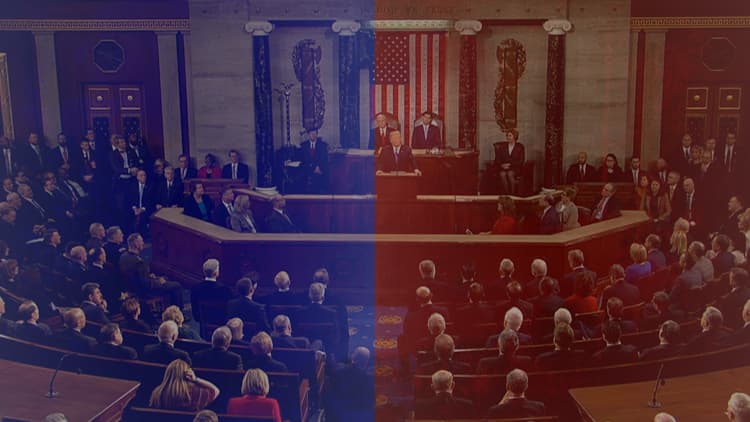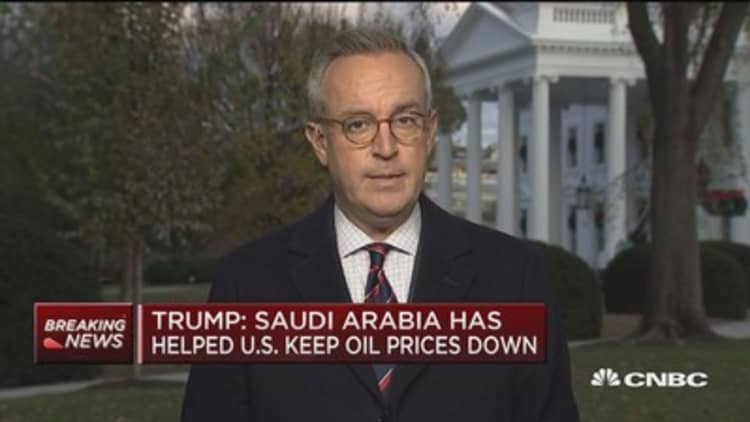Glowing views on President Donald Trump's handling of the U.S. economy have failed to boost his overall approval rating.
The trends outlined in two new major polls signal possible trouble for the president's 2020 re-election bid if the economy loses steam.
More than half of voters — 53 percent — approve of how Trump is handling the economy, versus 42 percent who disapprove, according to a Quinnipiac University poll released Tuesday. The economic approval rating is the highest the university has measured since Trump took office.
Read more: Economists see the Trump economy slowing drastically next year before a possible recession in 2020
Still, only 41 percent of voters said they approve of the job Trump is doing as president, while 54 percent said they disapprove. He gets better readings on the economy than any other issue area polled by Quinnipiac, including foreign policy, immigration, gun policy and race relations.
A CBS News poll released Tuesday found a similar divergence. It showed only 39 percent of Americans approve of Trump's overall job performance, even as 52 percent back his handling of the economy. About three-quarters of respondents, 74 percent, rated the economy as "very good" or "fairly good."

The gulf between economic outlook and opinions on Trump may come down to poor approval of his personality and behavior — traits such as honesty, leadership and values, according to Quinnipiac's Tim Malloy.
"Despite recent market downturns, voters are upbeat on what President Donald Trump has brought to the economy, but underwhelmed by just about every other aspect of the Trump tenure," Malloy, assistant director of the Quinnipiac University Poll, said in a statement. "Not honest, not level headed, not empathetic. The surging economy is offset by deep questions about the president's character and conduct."
While Trump's Republican Party lost at least 38 House seats and its majority in this month's midterm elections, the president has a good chance of winning a second term. The Electoral College system works in the president's favor, as he won the presidency in 2016 despite getting a smaller share of overall votes than Democrat Hillary Clinton. Traditional swing states Ohio and Florida look favorable to Trump — despite states he won such as Michigan, Pennsylvania, Wisconsin and Arizona tilting toward Democrats in this month's elections.
Trump has also used headline economic figures — solid jobs growth, the lowest unemployment rate in decades and quarterly gross domestic product growth above 3 percent — as the main evidence of his success in the White House.
Voters largely believe Trump has handled the economy well, but the president rarely goes higher than 45 percent in approval rating polls. As concerns about an economic slowdown spread, Trump could potentially lose his main selling point ahead of his re-election bid.
Pockets of Wall Street have started to forecast more sluggish economic growth in the near future. Jan Hatzius, chief economist at Goldman Sachs, wrote Sunday that "growth is likely to slow significantly next year, from a recent pace of 3.5 percent-plus to roughly our 1.75 percent estimate of potential by end-2019."

JPMorgan economists also anticipate economic growth will take a hit next year, slowing to a pace of 1.9 percent for 2019.
In some possible signs of cracks in the strong economy, several economic data points disappointed on Wednesday. Consumer sentiment came in at 97.5 in November, below estimates. Meanwhile, weekly jobless claims rose to a more than four-month high last week, and durable goods orders fell by the largest amount in 15 months in October.
The Trump administration has dismissed any notion of an economic slowdown. On Tuesday, the president's top economic advisor, Larry Kudlow, called expectations for a recession "nonsense" and said he does not "even remotely agree" with Goldman's assessment.
A White House spokeswoman did not immediately respond to a request to comment on the discrepancy between economic outlook and the president's approval rating.
Electoral expert and forecaster Nate Silver of FiveThirtyEight believes the prospect of a downturn poses risks for Trump in 2020. Silver writes that presidents typically win their re-election bids — even after struggles for their parties in the most recent midterm election. President George H.W. Bush was the last incumbent president to lose an election in 1992, and Trump's predecessor President Barack Obama won a second term after a wipeout of his Democratic Party in the 2010 midterms.
Yet, Silver notes that Obama and Presidents Bill Clinton and Ronald Reagan — who also earned second terms despite tough midterm elections — had the advantage of improving economies. That's where the problems for Trump could come in, as the economy does not have room to get much better, according to Silver.
He writes that "although the economy is very strong now, there is arguably more downside than upside for Trump (voters have high expectations, but growth is more likely than not to slow a bit)."
Of course, there is no guarantee that growth slows down, and Trump could go into the 2020 election with a strong economy behind him. Any number of factors could also boost his approval rating in the nearly two years before the November 2020 election.
Unknowns could also work against Trump in that time. Special counsel Robert Mueller will likely conclude his investigation into whether the Trump campaign coordinated with Russia during the 2016 election.
House Democratic investigations — and the possibility of Trump's tax returns revealing new information — also loom as the president looks toward his re-election.


